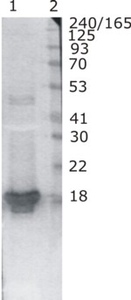Search from website
Search from website

Figure 1. Western Blot testing of natural latex extract using anti-Hev b1 antibody (A3-700-100, clone 1) Line 1. 10 µl of 20x diluted natural latex extract were loaded per line. Line 2. Protein size marker.
Catalogue #
A3-700-100
Name
Mouse mAb to Hev b1 (Rubber elongation factor, REF) (clone 1-1)
Target
Hev b1
Target Description
Hev b1 - MBP fusion protein expressed and purified from E. coli.
Alternative Names
Rubber elongation factor protein – REF (Hevea brasiliensis)
Uniprot ID
P15252
Clonality
Mouse monoclonal
Clone
1-1
Class
mIgG2a
Reactivity
Recombinant and native Hev b1
Application
ELISA, WB
Protocol
ELISA:
0.03 – 0.1 µg/ml. Reacts as detection antibody in Capture ELISA with Hev b1 binding monoclonal antibody A3-701-100
WB:
0.25 – 0.5 µg/ml
Purification
Protein G purification
Buffer
PBS, 0.1% sodium azide
Related Products
A3-700-100 - mouse monoclonal antibody to Hev b1, used as a detection antibody in pair with binding antibody A3-701-100 in capture ELISA. Monoclonal antibodies to Hev b3, Hev b5 and Hev b6.02 are available.
Shipping
This product is shipped in non-frozen liquid form in ambient conditions
Storage
Store at - 20 …-70 °C upon receipt. Divide antibody into aliquots prior usage. Avoid multiple freeze-thaw cycles as product degradation may result
Background
Liquid latex from the rubber tree, Hevea brasiliensis, is the source of natural rubber latex (NRL) and contains over 200 proteins; 14 of them have been identified as allergens. Only some allergens retain their allergenic properties through the manufacturing processes. The NRL allergens that have been shown to be clinically relevant to genuine NRL allergy, and present in the final NRL products with maintained allergenicity are Hev b1, Hev b3, Hev b5 and Hev b6.02
References
ASTM D7427 - 08e1 Standard Test Method for Immunological Measurement of Four Principal Allergenic Proteins (Hev b 1, 3, 5 and 6.02) in Natural Rubber and Its Products Derived from Latex.
Koh D, Ng V, Leow YH, Goh CL. 2005.
A study of natural rubber latex allergens in gloves used by healthcare workers in Singapore. Br J Dermatol. 153(5):954-9.
Palosuo T, Alenius H, Turjanmaa K. 2002.
Quantitation of latex allergens. Methods. 27(1):52-8.
Peixinho C, Tavares-Ratado P, Tomás MR, Taborda-Barata L, Tomaz CT. 2008.
Latex allergy: new insights to explain different sensitization profiles in different risk groups. Br J Dermatol. 159(1):132-6.
Kang PB, Vogt K, Gruninger SE, Marshall M, Siew C, Meyer DM. 2007.
The immuno cross-reactivity of gutta percha points. Dent Mater. 23(3):380-4.
This product is for research use only
TECHNICAL ASSISTANCE
Please refer any technical questions to
technical.support@icosagen.com